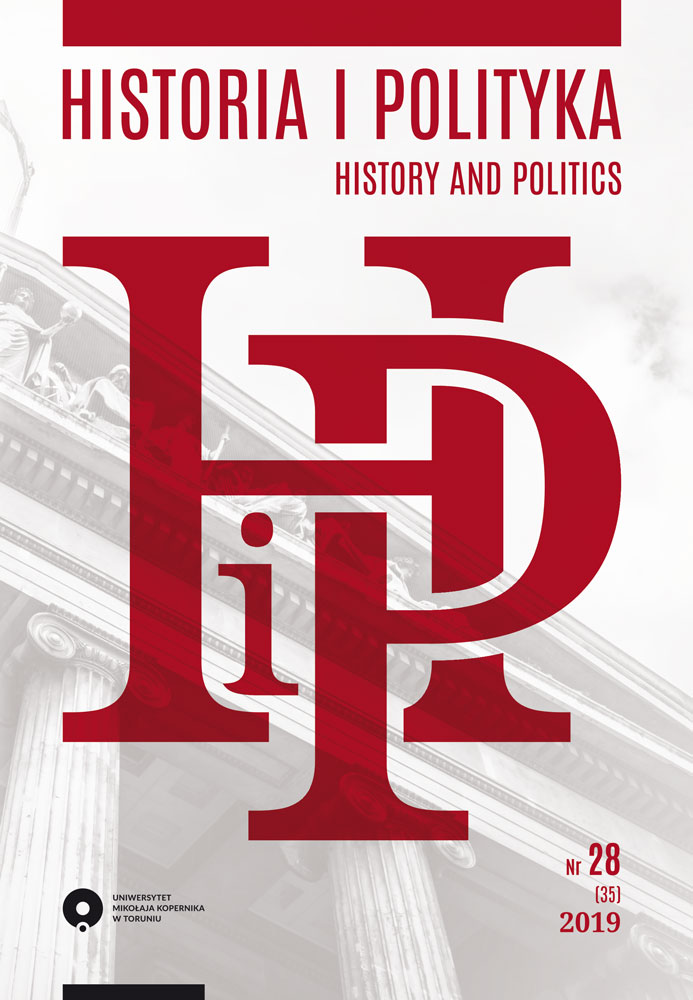Position of the People’s Republic of China Towards the Crisis in Libya in 2011
DOI:
https://doi.org/10.12775/HiP.2019.014Keywords
People’s Republic of China, Libya, crisis in Libya, China’s foreign policy, “Responsibility to Protect”Abstract
The subject of the analysis is the attitude of the People’s Republic of China towards the crisis in Libya in 2011. The problem is considered taking into account both the bilateral China-Libya and multilateral situation at the time. The paper discusses issues such as China’s cooperation with Libya before the crisis and Beijing’s actions at consecutive stages of the crisis, focusing mainly on the evolution of China’s position towards the question of imposing and implementing sanctions against Libya as well as towards the political representation of the Libyan rebel groups. The discussion is presented in the context of Beijing’s compliance with its traditionally professed foreign policy principles and its attitude towards the concept of “Responsibility to Protect”. The case of the Libyan crisis has shown that China does not have a coherent strategy for dealing with internal military conflicts that generate humanitarian disasters in foreign states.
References
Branigan, T. (2011). China Looks to Protect its Assets in a Post-Gaddafi Libya. The Guardian. Retrieved from: https://www.theguardian.com/world/2011/aug/23/china-assetspost-gaddafi-libya.
Carvin, S. (2011). UNSC Resolution 1970: Wait, Did the UN Just Kinda Do What it Was Supposed to? Retrieved from: http://duckofminerva.com/2011/03/unsc-resolution-1970-wait-did-un-just.html.
Copper, J.F. (2016). China’s Foreign aid and Investment Diplomacy. Volume III. Strategy Beyond Asia and Challenges to the United States and the International Order. London – New York: Palgrave Macmillan.
Ding, S. (2016). The Political Rationale of China’s Deliberately Limited Role in the Libyan Civil War. In: D. Henriksen, A.K. Larssen (eds.). Political Rationale and International Consequences of the War in Libya (pp. 78–89). Oxford: Oxford University Press.
Duggan, N. (2016). China’s Changing Role in its All-Weather Friendship with Africa. In: S. Harnisch, S. Bersick, J-C. Gottwald (eds.). China’s International Roles (pp. 207–225). London – New York: Routledge.
Erdağ, R. (2017). Libya in the Arab Spring. From Revolution to Insecurity. New York: Palgrave Macmillan.
Erian, S. (2012). China at the Libyan Endgame. Policy, 28(1), 49–53. Retrieved from: https://www.cis.org.au/app/uploads/2015/04/images/stories/policy-magazine/2012-autumn/28-1-12-stephanie-erian.pdf.
Explanation of Vote by Ambassador Li Baodong after Adoption of Security Council Resolution on Libya. (2011). Retrieved from: http://www.china-un.org/eng/hyyfy/t807544.htm.
Falk, R. (2015). Humanitarian Intervention and Legitimacy Wars. Seeking Peace and Justice in the 21st Century. London, New York: Routledge.
Gaudreau, M. (2016). Plurality in China’s South South Cooperation: The Case of Rice Projects in Mali. In: H. Cao, J. Paltiel (eds.). Facing China as a New Global Superpower. Domestic and International Dynamics from a Multidisciplinary Angle (pp. 217–237). Singapore: Springer.
Harnisch, S. (2016). China’s Historical Self and its International Role. In: S. Harnisch, S. Bersick, J-C. Gottwald (eds.). China’s International Roles (pp. 38–58). London-New York: Routledge.
Hoyt, T.D. (2016). US–China Cooperation: The Role of Pakistan After the Death of Osama bin Laden. In: J.H. Ping, B. McCormick (eds.). China’s Strategic Priorities (pp. 114–128). London, New York: Routledge.
Junbo, J., Méndez, A. (2015). Change and Continuity in Chinese Foreign Policy: China’s Engagement in the Libyan Civil War as a Case Study. London: LSE Global South Unit.
Junbo, J., Zhimin, Ch. (2016). China and the EU in the UN. In: J. Wang, W. Song (eds.). China, the European Union, and the International Politics of Global Governance (pp. 75–94). New York: Palgrawe Macmillan.
Lanteigne, M. (2016). Chinese Foreign Policy. An Introduction. London, New York: Routledge.
Li, M., Kemburi, K.M., Hongzhou, Z. (2015). Growth of China’s Power: Capabilities, Perceptions, and Practice. In: M. Li, K.M. Kemburi (eds.). China’s Power and Asian Security (pp. 3–24). London, New York: Routledge.
Liu, M. (2011). China’s Libya Connection Shows New Kind of Foreign Policy. Daily Beast. Retrieved from: https://www.thedailybeast.com/chinas-libya-connection-shows-newkind-of-foreign-policy?ref=scroll.
MacDonald, A. (2016). Access, Assurance and Acceptance. In: H. Cao, J. Paltiel (eds.). Facing China as a New Global Superpower. Domestic and International Dynamics from a Multidisciplinary Angle (pp. 171–196). Singapore: Springer.
Martina, M., Buckley, Ch. (2011). China Urges Libya to Protect Investments. Retrieved from: https://www.reuters.com/article/us-china-libya-oil/china-urges-libya-to-protect-invest-ments-idUSTRE77M0PD20110823.
Nathan, A.J. (2009). Principles of China’s Foreign Policy. Retrieved from: http://afe.easia.columbia.edu/special/china_1950_forpol_principles.htm.
NATO. (2011). Operation UNIFIED PROTECTOR. Final Mission Stats. Retrieved from: http://www.nato.int/nato_static/assets/pdf/pdf_2011_11/20111108_111107-factsheet_up_factsfigures_en.pdf.
Olimat, M.S. (2014). China and North Africa since World War II. A Bilateral Approach. New York: Lexington Books.
Rogers, D. (2016). Chinese Consortium to Invest $36bn in Libya Infrastructure Bonanza. Retrieved from: http://www.globalconstructionreview.com/news/chinese-consort7ium-inv7est-36bn-liby7an/.
Shichor, Y. (2017). Maximising Output While Minimising Input: Change and Continuity in China’s Middle East Policy. In: H.T. Boon (ed.). Chinese Foreign Policy Under Xi (pp. 109–129). London, New York: Routledge.
Sotloff, S. (2012). Chinas Liby’a Problem. The Diplomat. Retrieved from: https://thediplomat.com/2012/03/chinas-libya-problem/.
Statement by H.E. Ambassador Li Baodong, Permanent Representative of China to the United Nations, at the Security Council Briefing on the Situation in Libya. (2011a). Retrieved from: http://www.china-un.org/eng/chinaandun/securitycouncil/regionalhotspots/africa/t824181.htm.
Statement by H.E. Ambassador Li Baodong, Permanent Representative of China to the United Nations, at the Security Council Open Debate on the Protection of Civilians in Armed Conflict. (2011b). Retrieved from: http://responsibilitytoprotect.org/china(1).pdf.
Sun, Y. (2012). Syria: What China Has Learned From its Libya Experience. Asia Pacific Bulletin, 152, 1–2.
The Libyan Dilemma. (2011). Retrieved from: https://www.economist.com/asia/2011/09/10/the-libyan-dilemma.
United Nations. (2011a). Resolution 1970 (2011). Adopted by the Security Council at its 6491th meeting, on 26th February 2011. Retrieved from: http://www.un.org/en/ga/search/view_doc.asp?symbol=S/RES/1970(2011).
United Nations. (2011b). Resolution 1973 (2011). Adopted by the Security Council at its 6498th meeting, on 17 March 2011. Retrieved from: http://www.un.org/en/ga/search/view_doc.asp?symbol=S/RES/1973(2011).
United Nations. (2011c). Resolution 2009 (2011). Adopted by the Security Council at its 6620th meeting, on 16 September 2011. Retrieved from: http://www.un.org/ga/search/view_doc.asp?symbol=S/RES/2009%20%282011%29.
Xueguan, M. (2018). Libya Seeks China’s Help for Economic Revival and Political Settlement. Retrieved from: http://www.xinhuanet.com/english/2018-02/20/c_136985954.htm.
Zweig, D. (2015). Modelling ‘Resource Diplomacy’ Under Hegemony: The Triangular Nature of Sino – US Energy Relations. In: D. Zweig, Y. Hao (eds.). Sino-US Energy Triangles. Resource Diplomacy Uunder Hegemony (pp. 19–37). London – New York: Routledge.
Downloads
Published
How to Cite
Issue
Section
License
Nicolaus Copernicus University fully respects the right to privacy and protection of personal data of all authors. The authors’ personal data is not used for commercial and/or marketing purposes.Stats
Number of views and downloads: 507
Number of citations: 0



